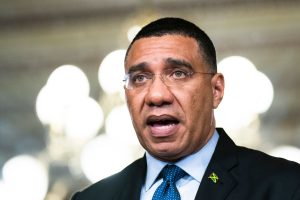Jamaican Prime Minister Andrew Holness elected to a third term as main opposition candidate concedes

Jamaican Prime Minister Andrew Holness elected to a third term as main opposition candidate concedes
KINGSTON, Jamaica (AP) — Jamaican Prime Minister Andrew Holness secured a third term early Thursday following a tight race on an island shaken by corruption, inequity and economic concerns.
Preliminary results showed that Holness’ Jamaica Labor Party won at least 34 seats, while Mark Golding’s opposition People’s National Party secured at least 29 seats.
Golding conceded the election in a brief speech, saying he was disappointed in the outcome as he acknowledged the success of his opponent.
“This is not an easy speech to make,” he said.
Also participating in Wednesday’s general elections were the Jamaica Progressive Party, the United Independents’ Congress and nine independent candidates seeking a seat in various constituencies.
Official voter turnout was just 38.8%, only slightly higher than the turnout for the 2020 elections during the pandemic.
Just over 2 million registered voters are eligible to cast their ballots on the island of 2.8 million people.
A total of 63 seats are up for grabs in Jamaica’s House of Representatives. The leader of the party that wins a majority becomes the island’s next prime minister.
The new leader will then appoint 13 of 21 senators to Jamaica’s upper chamber of Parliament, and the opposition will choose eight others.
Concerns despite drop in crime
Under Holness, Jamaica has seen a 43% drop in killings so far this year, marking the most significant decline in decades. The improvement is largely credited to the current administration’s increase in firearm seizures and a stronger, coordinated security force presence across the Caribbean island.
The Jamaica Labor Party campaigned on this tangible success, positioning itself as the government that pulled the island back from the brink of widespread violence.
While crime statistics have improved, the shadow of Jamaica’s violent past still lingers. The measures taken by the current government, including implementing states of emergency in certain areas, have drawn both support and criticism.
The private sector and many Jamaicans have praised the effectiveness of such measures, with the number of killings dropping by as much as 70% in some regions, like the tourist parish of St. James.
However, human rights organizations have raised concerns about the use and potential abuse of such measures, highlighting alleged illegal detentions, as they call for balanced approaches to protect security and civil liberties.
The Jamaica Labor Party also emphasized fiscal responsibility, a low unemployment rate and the importance of continuity as it urged voters not to risk reversing the progress achieved so far.
A pledge comes under fire
On Sunday, Holness pledged that his party would double the current minimum wage of $100 per 40-hour workweek if reelected.
“We believe in growing the economy so that everyone gets a bigger slice. As the economy expands, we must ensure those at the bottom are rewarded fairly, while creating incentives for more Jamaicans, especially our youth, to join the labor force,” he said at a recent rally.
But his pledge drew criticism from groups representing various business sectors.
“Tourism accounts for approximately one-third of Jamaica’s gross domestic product and is one of the country’s largest employers,” the Jamaica Hotel and Tourist Association said.
“Any shifts in wage policy will therefore have wide-ranging implications for the sector, including employment levels, competitiveness and the affordability of the Jamaican tourism product.”
‘Tired of the conditions’
The People’s National Party, or PNP, had adopted a sharper, more critical tone before the election. It asserted that while progress has been made, many Jamaicans still feel the pinch of socioeconomic challenges, including poverty, inadequate infrastructure and lingering pockets of crime and corruption.
“There are a lot of frustrated people tired of the conditions in which they live,” Golding told reporters as he voted on Wednesday.
The party aimed to channel public discontent into a mandate for change, promising reforms, renewed social investments and a break from what it calls “complacency” in governance.
Key among the party’s raft of policy proposals to address the socioeconomic woes of Jamaicans is increasing the income tax threshold to $21,800, up from the current $11,200. The opposition party says it wants working-class Jamaicans to take home more money as a cushion against rising prices.
Despite Jamaica’s vibrant democratic tradition, recent years have seen a decline in poll participation.
On Aug. 29, members of Jamaica’s security forces and election day workers cast their ballots for this year’s election. The electoral office reported a 57% turnout.
___
Associated Press Dánica Coto in San Juan, Puerto Rico contributed.
By JOHN MYERS
Associated Press
